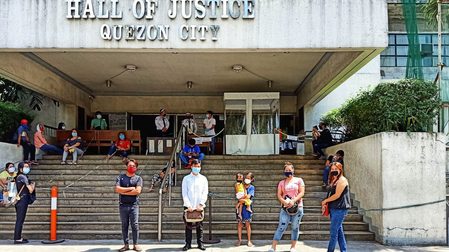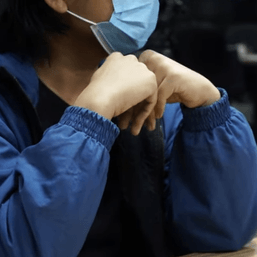SUMMARY
This is AI generated summarization, which may have errors. For context, always refer to the full article.
![[OPINION] The silent epidemic stalking Filipino lawyers](https://www.rappler.com/tachyon/2020/11/tl-silent-epidemic.jpg)
Judge Jeaneth Gaminde San Joaquin was ambushed just this October. 22 days after, Judge Teresa Abadilla was shot and killed inside her own chambers. A week after that, 35-year-old lawyer Eric Magcamit was assassinated while on his way to a hearing in Narra, Palawan. And as I write this, a retired Court of Appeals justice based in Pampanga remains missing.
I cannot claim to know Judge Tessa as well as others. But in our interactions in law school and in the Supreme Court (as law clerks), I can confirm the testimony of her close friends that Judge Tessa was a gentle, self-effacing soul whose death was a “loss to the judiciary” (as described by the Chief Justice). And while I don’t know Judge San Joaquin (who survived the slay try) or Atty. Magcamit, I am certain of these facts – they have families, they have loved ones, and they are human beings. As the IBP Palawan Chapter observed, “Atty. Eric is a brilliant and respected young lawyer. But more than that, he is a loving and affectionate husband and father; a kind, generous, and God-fearing human being.”
Around 53 lawyers have been killed since 2016. That’s like 10 per year, or almost 1 per month. The rate has reached a point where we’ve become used to the ritual of issuing statements “condemning” and “decrying” their deaths. But after 53 killed, one asks whether that is all we can do. One asks whether it is all they deserve. Lian Buan, a journalist who covers the judiciary, recently tweeted, “The legal profession is under attack. DO something.”
The first step is to consider the enormity of what’s happening and look beyond the individual cases. Because these deaths, while not similar, are interconnected. They tell us that the delicate tapestry that binds society to order is fraying.
The legal profession is suffering from a silent epidemic, its members stalked by assassins who have stopped being afraid of the Rule of Law. The specter of death has entered the very chambers of our magistrates. And even retirement no longer provides solace as even a retired justice can disappear.
With 53 dead, a timely and practicable plan of action (not a “policy statement”) to stop these killings is the priority. No judge or lawyer should ever fear doing what they were sworn to do. And lawyers as young as Atty. Magcamit should be able to attend hearings without fearing assassination. It is now a challenge to the leadership of the Bar to create those conditions.
It can start by pushing the Judicial Marshals Service Bill through Congress. This bill creates an independent service charged with the protection of the judiciary. Right now, the judiciary ultimately leans on the PNP/Executive for security requirements. This bill allows the judiciary to truly protect its judges. It is understandable for the High Court to be wary of actively pushing legislation through Congress. That creates too many institutional entanglements. No similar limitation exists for the leaders of the Bar. And as “officers of the court,” it falls on our leaders to take on a more active role to push this bill through the legislative mill.
Next, it is time for a dedicated inquiry not on the individual cases, but on the pattern and rate of these killings. That so many judges are dead, and that so many lawyers have been assassinated in so short a period by itself merits a closer look. We need to look at the forest and find out why the lives of lawyers and judges are being snuffed out so easily and so cheaply.
We need to do both (and much more) not just out of self-preservation, but to prove that in this country, law still prevails. Because there is no clearer indicator of the degradation of the Rule of Law than seeing its ministers killed at an alarming rate. If the members of a powerful profession can be gunned down with impunity, where does that leave the less fortunate? And if the profession is unable to move other institutions to stop an epidemic of killings attacking its own members, then how desperate will other citizens feel? And as the pattern unravels, how many citizens will still see law as an effective solution to disputes?
Equally important, we need to reflect on the Filipino public’s reaction to the 53 killings. Just this September, people in Haiti took to the streets when a prominent advocate was shot in his home. In Buxar, India, protests erupted when a 35-year-old lawyer was assassinated near a gas station – the 5th lawyer killed in 8 months. Here, we have 53 dead. Yet, it feels that the public remains unmoved. It is a bitter pill, but we need to ask ourselves why.
In legal philosophy we are taught that law is a craft that relies on artificial concepts – “rules” – whose only real power is the belief that following the “rules” is better. We were also warned that if society comes to see the “Rule of Law” as the “rule of the powerful,” then that myth loses power and the public withdraws its protection.
Maybe that’s why ending these killings ultimately requires something from all of us lawyers. We need to go back to the values these “rules” represent, instead of mouthing phrases that the public apparently no longer appreciates. And we need to remember that while society chose law because the alternative was violence and chaos, that “contract” holds only if lawyers maintain law as a viable alternative for every Filipino. The enormity of such a task seems daunting, but isn’t it precisely why we say law is a “noble” profession? Perhaps earning back the trust of a disaffected public is a “noble” endeavor on its own. And if it is, perhaps the next time a lawyer or judge is murdered, the public itself will come to the Rule of Law’s defense – just like they did in India and Haiti. – Rappler.com
John Molo is a commercial law litigator who enjoys reading and learning about the Constitution and its intersection with politics. He teaches Constitutional Law at UP Law-BGC, where he also chairs the Political Law Cluster of the Faculty. He is the President of the Harvard Law School Association of the Philippines, and a past Chairman of the IBP Law Journal. He led the team that sued the Aquino administration and invalidated the PDAF.
Add a comment
How does this make you feel?







There are no comments yet. Add your comment to start the conversation.